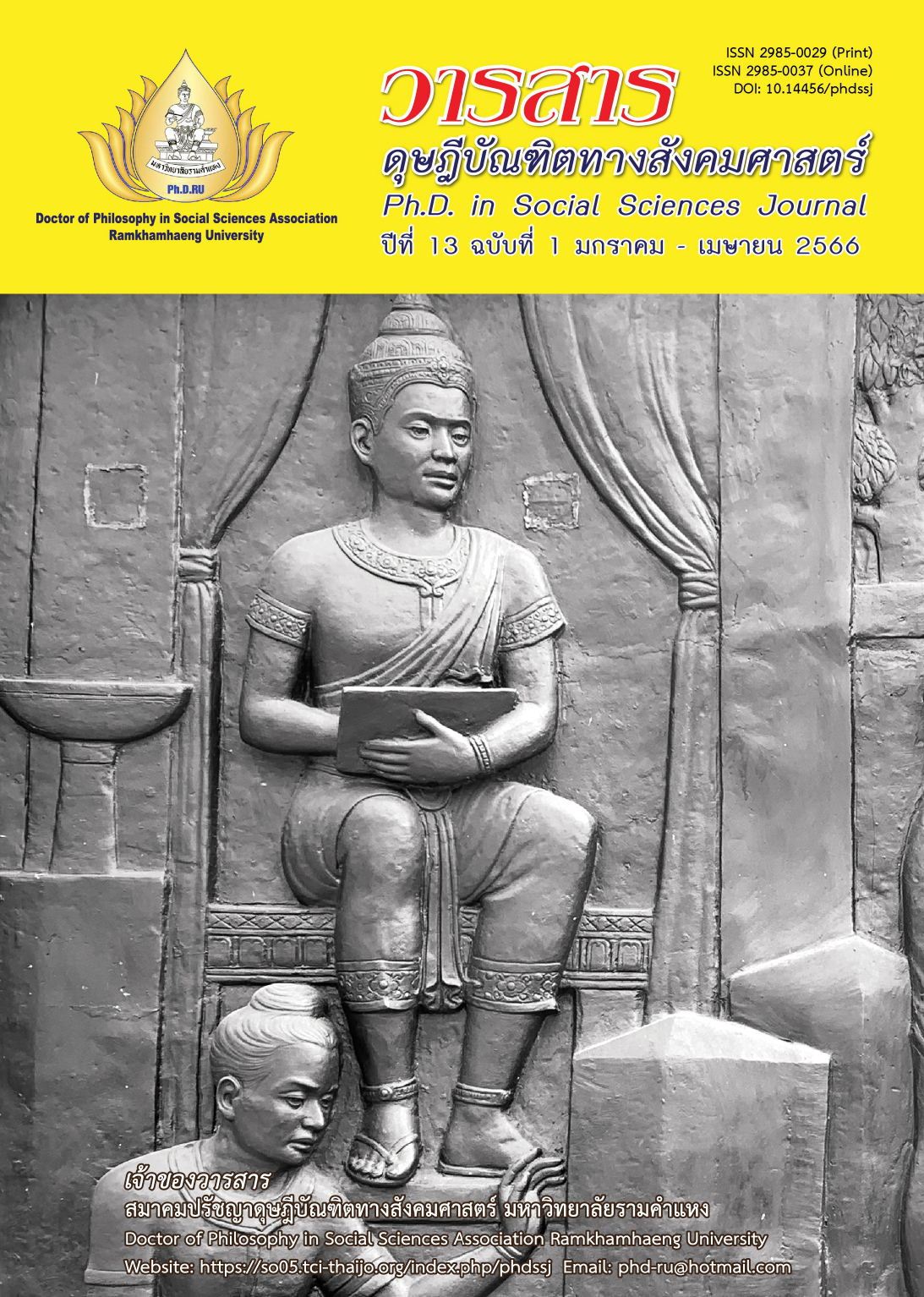การวิเคราะห์การสร้างกรอบความคิดแบบเติบโตของเยาวชนไทยบนความสัมพันธ์ระหว่างโครงสร้าง-ผู้กระทำการ
Main Article Content
บทคัดย่อ
บทความวิชาการนี้มีวัตถุประสงค์เพื่อการสร้างกรอบความคิดแบบเติบโตของเยาวชนไทย ภายใต้มุมมองทางสังคมวิทยาบนพื้นฐานความสัมพันธ์ระหว่างโครงสร้างและผู้กระทำการ (structure-agency) กล่าวคือ จากวรรณกรรมปริทัศน์เรื่องกรอบความคิดแบบเติบโตในสังคมไทย พบว่า การศึกษาส่วนใหญ่ให้ความสำคัญกับเยาวชนตลอดจนบุคคลที่อยู่ใกล้ตัวเด็กนักเรียนมากที่สุดอย่างผู้ปกครอง หรือคุณครู ในฐานะผู้กระทำการ โดยประเด็นที่ศึกษาส่วนใหญ่มักเกี่ยวข้องกับตัวชี้วัดคุณลักษณะของผู้มีกรอบความคิดแบบเติบโต อย่างไรก็ตาม การวิเคราะห์เชิงโครงสร้างไปที่สถาบันทางสังคม รวมทั้งนโยบายสังคมที่มีผลต่อการสร้างกรอบความคิดแบบเติบโตกลับพบในจำนวนที่จำกัด
ผลการวิเคราะห์ พบว่า การสร้างกรอบความคิดแบบเติบโตในเด็กนักเรียนมิได้เกี่ยวข้องแค่กับผู้กระทำการที่ใกล้ชิดกับตัวเด็กนักเรียนอย่างผู้ปกครองและคุณครูเท่านั้น แต่ยังเกี่ยวข้องกับนโยบายด้านการศึกษาที่สะท้อนผ่านหลักสูตร แบบเรียน กิจกรรม รวมทั้งคุณครูและผู้ปกครองเองก็ล้วนเป็นผู้กระทำการที่เป็นส่วนหนึ่งในการผลิตและผลิตซ้ำกฎเกณฑ์และทรัพยากรภายใต้โครงสร้างสังคมดังกล่าวด้วยเช่นกัน
Article Details

อนุญาตภายใต้เงื่อนไข Creative Commons Attribution-NonCommercial-NoDerivatives 4.0 International License.
บทความวิชาการ บทความวิจัย และบทวิจารณ์หนังสือในวารสารดุษฎีบัณฑิตทางสังคมศาสตร์ เป็นความคิดเห็นของผู้เขียน มิใช่ของคณะผู้จัดทำ และมิใช่ความรับผิดชอบของสมาคมปรัชญาดุษฎีบัณฑิตทางสังคมศาสตร์ มหาวิทยาลัยรามคำแหง (กรณีการทำวิจัยในมนุษย์ ผู้วิจัยต้องผ่านการอบรมจริยธรรมการวิจัยในมนุษย์ และนำหลักฐานมาแสดง)
เอกสารอ้างอิง
Altinyelken, H. K., Verger, A., & Novelli, M. (2012). Global education policy and international development: An introductory framework. Retrieved from https://www.researchgate.net/publication/284729302_Global_Education_Policy_and_International_Development_An_Introductory_Framework
Aodton, M. (2018). The effects of the growth mindset program in upper secondary school students. Master’s Thesis of Science in Education, Burapha University. [In Thai]
Blackwell, L. S., Trzesniewski, K. H., & Dweck, C. S. (2007). Implicit theories of intelligence predict achievement across an adolescent transition: A longitudinal study and an intervention. Child Development, 78(1), 246-263.
Chaiwat, T., Mai-ngam, N., & Amesbutra, J. (2021). Learning coin for equitable education. Equitable Education Fund, Thailand. [In Thai]
Dale, R. (1999). Specifying globalisation effects on national policy: Focus on the mechanism. Journal of Education Policy, 14(1), 1-17.
Dweck, C. S. (2006). Mindset: The new psychology of success. Random House.
Giddens, A. (1979). Central problems in social theory, action, structure and contradiction in social analysis. Macmillan.
Haimovitz, K., & Dweck, C. S. (2016). Parents’ views of failure predict children’s fixed and growth intelligence mind-sets. Psychological Science, 27(6), 859-869.
Haimovitz, K., & Dweck, C. S. (2017). The origins of children’s growth and fixed mindsets: New research and a new proposal. Child Development, 88(6),1849-1859.
Hammersley, M. (1984). Some reflections upon the macro-micro problem in the sociology of education. Sociological Review, 32(2), 316-324.
Hargreaves, A. (1985). The micro-macro problem in the educational research. In R. Burgess (Ed.). Issues in educational research: Qualitative methods. The Falmer Press.
Kidkana, U., & Rittidet, P. (2014). Educational reformation by developing problem solving thinking. Journal of Research for Social and Community Development, Rajabhat MahaSarakham University, 1(1), 65-73. [In Thai]
Laothong, S. (2020). Growth mindset intervention in teaching and learning: Meta-analysis and content analysis. Doctoral Thesis of Education in Educational Studies, Rangsit University. [In Thai]
Mongkolpanich, P., & Joongpan, C. (2022). An analysis of science textbook for lower secondary education during 10th-12th national economic and social development plan (2007-2021). Journal of MCU Peace Studies, 10(5), 1909-1925.
Nootpong, W. (2018). “Land and air of growth” The characteristics and the contexts of students with growth mindset. A multiple case study of middle school students in small extended educational opportunity schools under the Bangkok metropolitan administration. Master Thesis of Education in Learning Sciences and Educational Innovation, Thammasat University. [In Thai]
Olssen, M., Codd, J., & O’Neill, A. (2004). Education policy: Globalization, citizenship and democracy. Sage.
Phonphotthanamat, W. (2015). Thai education problems: An interview from educational. Journal of Education Thaksin University, 15(2), 48-55. [In Thai]
Pimpa, P. (2018). Current Thai studies. Academic Journal of Mahamakut Buddhist University Roi Et Campus, 7(1), 242-249. [In Thai]
Puanghut, C. (2004). Structure-agency debate and the overcoming of the problematic dualism in social theory: Marxism VS Foucault. Journal of the Faculty of Arts, Silpakorn University, 26(2), 74-135. [In Thai]
Ritzer, G. (2007). Contemporary sociological theory and its classical roots, the basics (2nd. ed.). McGraw-Hill.
Rizvi, F., Engel, L., Nandyala, A., Rutkowski, D., & Sparks, J. (2005). Globalization and recent shifts in educational policy in the Asia Pacific: An overview of some critical issues. UNESCO, Bangkok, Thailand.
Rohitasthira, B. (2017). Growth mindset and education reform. Retrieved from https://www.moe.go.th/growth-mindset-กับการปฏิรูปการศึกษา
Rungrueng, C., & Chadcham, S. (2016). Growth mindset: New approach of human potential development. Research Methodology & Cognitive Science, 14(1), 1-13. [In Thai]
Shilling, C. (1992). Reconceptualising structure and agency in the sociology of education: Structuration theory and schooling. British Journal of Sociology of Education, 13(1), 69-87.
Thianthai, C., & Sutamchai, K. (2022). Skills that matter: Qualitative study focusing on the transfer of training through the experience of Thai vocational students. Frontier in Education, 7(897808), 1-14. [In Thai]
Thianthai, C., Tamdee, P., Assavarak, P., Jiaviriyaboonya, P., & Pewnil, T. (2021). Understanding Thai digital natives’ characteristics, behaviors, and their view of the future . National Research Council of Thailand. [In Thai]
Thieanphut, D. (2015). A New Challenge for building educational strategy. Journal of Educational Administration, Khon Kaen University, 11(2), 1-22. [In Thai]
Thitavaddhano, P. Y., & Phupongsakorn, A. (2018). Education policies under the national economic and social development plan. Journal of Educational Review Faculty of Educational in MCU, 3(3), 30–46. [In Thai]
Tippawon, C. (2019). Development of indicators of growth mindset for sixth grade students. Master Thesis of Education in Education Research and Evaluation, Mahasarakham University. [In Thai]
Wisessathorn, M., Saetang, P., Paimpuech, R., & Sarobrass, C. (2022). The development of growth mindset test for coding teachers. Journal of Education Naresuan University, 24(2), 232-247. [In Thai]
Yokchoo, K. (2018). Study and enhancement growth mindset of pre-service teachers. Doctoral Thesis of Philosophy in Research and Development on Human Potentials, Srinakharinwirot University. [In Thai]


